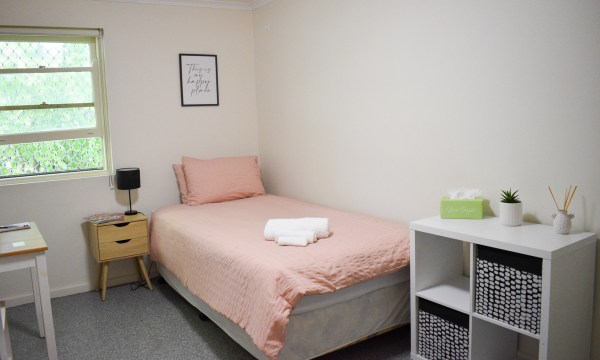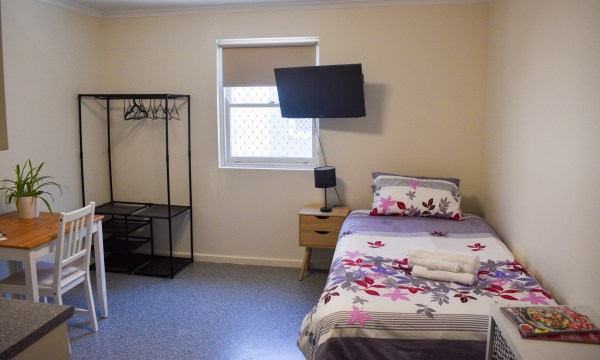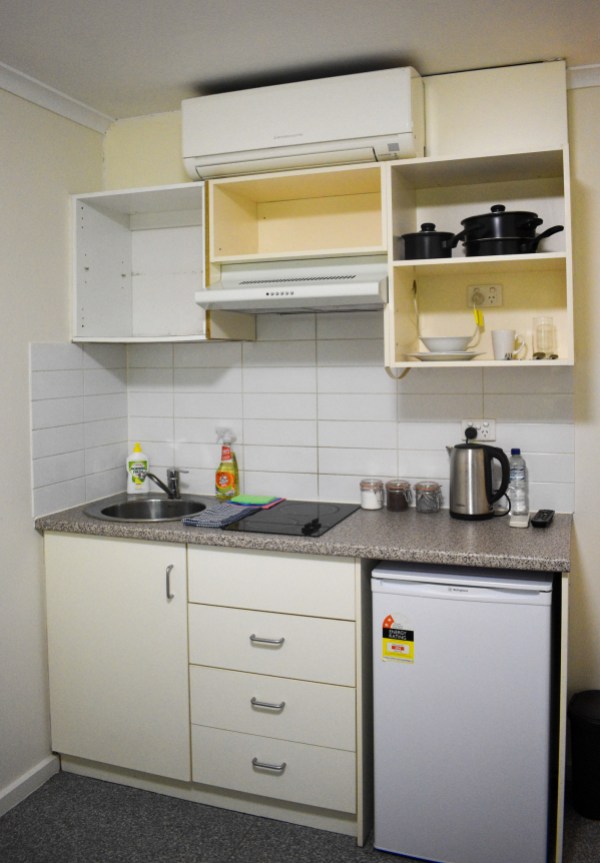The Wright Place to call home

A women-only crisis accommodation centre has opened in Wright Street, so CityMag visited to learn more about how it makes tenants feel at home.
As a child, Anmatjere/Arrente artist Rhubee Neale was told by her late mother: “We are all flowers in God’s Garden”.
Rhubee has channelled that message into “Spring Flowers” a painting which depicts a paradise of safety, and hangs in each room at the new Wright Place crisis accommodation for women.
Once the women housed in the 10 furnished units have received support and moved on to their next, longer-term home, Rhubee’s painting will go with them, marking what could be the first piece of art they own.
Wright Place, the short-term accommodation located in Wright Street, is full of these little touches in their light-filled rooms with positive art and extra bedding – another item they can call their own when they move on to more permanent housing.
Rhubee, the artist responsible for the colourful mementos, is the first tenant and official caretaker of Wright Place.

She experienced homelessness earlier this year, after moving from Yulara in the Northern Territory to Adelaide in December 2022 to follow her passions for singing and painting.
Rhubee couch-surfed with friends until she found support through the Toward Home Alliance, which led her to the not-for-profit Carrington Cottages.
Toward Home Alliance encompasses Baptist Care SA, Hutt St Centre, Aboriginal Family Support Services and more organisations, with the support of the State Government’s Housing Authority.
When initially placed in a room at Carrington Cottage’s Jordan Place accommodation, Rhubee says she started to get her self-worth back.
“I was just grateful for my room, no matter what in life is going on, I could always go back to my little room and paint,” Rhubee says.
In addition to having a safe space to practice her art, Rhubee says her mindset started to shift as she was able to build a routine and have a space to cook healthy meals and exercise.
You might like
Carrington Cottages CEO, Karen Aistrope, says when Rhubee was in Jordan Place she demonstrated qualities of resilience, determination and creativity.
When they knew the Wright Place location would be launched, they wanted those qualities front and centre, so Rhubee was offered a paid role as caretaker.

Rhubee will continue on her housing journey, but for now, she has a room at Wright Place where her role as caretaker includes facilitating art classes, sharing her story and being there in a peer-support capacity for other tenants.
“It’s vital to have that women’s only separate spot because you get to share things that you feel and there’s no one judging you, you can divulge what you want to divulge,” Rhubee says.
Rhubee experienced 15 years of domestic violence and says going back to your first passion “before the road was broken” – in her case singing – allowed her to build a path around her trauma.
“It’s all about that self-care again, because you’re not feeling worthy, you have all the negative things that have been pushed onto you,” she says.
“I know when I went through domestic violence that stripped me right down to the core.
“I’m actually feeling like me again, and this place, Wright Place… oh my goodness, that name is so good, this is the right place, I’m actually thinking up a jingle!”

The Australian Institute of Health and Welfare has reported that the number of women aged 55 and over experiencing homelessness grew by over 30 per cent between 2011 and 2016.
Shaya says increasing numbers of single and double-income families have to sleep in cars and move out of communities they’ve been in for a long time due to the current housing crisis.
“Homelessness is now becoming extremely multifaceted and an experience close to all of us,” she says.
“Women over 50 is certainly a community group we need to respond to. However, what we’ll find moving forward is that we need to become more flexible and adaptable and responsive to a whole range of community needs.”
Shaya says the Toward Home Alliance supports more than 5600 people every year across the city, south and Adelaide Hills regions. They often hear from the people they support that there’s a need for women-specific accommodation.
“It’s really important to have a really women’s specific space that represents safety, healing and recovery,” she says.

Subscribe for updates
Shaya says crisis accommodation has shared communal spaces, with Wright Place offering a larger shared kitchen, shared laundry and garden, so having women tenants supports a healing environment and creates a space with less triggering.
Previous episodes of trauma, domestic violence, mental health or physical health challenges are often exposed and triggered by experiences of homelessness.
“Homelessness never exists in isolation,” Shaya says.
“We know that the longer someone stays homeless or experiences homelessness, that trauma compounds.
“For every woman we’re responding to, we need to be doing so from a gendered lens.
“Of course, that’s not just for women, men have their own needs, LGBTQIA+ people, and young people as well.”

Wright Place is a collaborative intensive Housing Support Program that connects individuals with the support they need to eventually move them to ongoing, long-term, affordable housing.
The main collaborators are Toward Home Alliance providing case management and on-site support, with Carrington Cottages providing tenancy management and having done the room fit-outs within the building which was provided by Baptist Care SA at no cost.
They also work closely with Catherine House, the Aboriginal Legal Rights Movement and other partners.
“The real heroes of this work is our frontline workers because they’re meeting people in crisis every single day, trying to respond in a trauma-informed way, and really walk with someone on their recovery journey,” Shaya says.
The Wright Place accommodation was created without any additional government funding and is currently funded for 12 months.
Minister for Human Services Nat Cook says collaborations like this in SA’s homelessness sector benefit clients and are something we’ll “slowly but surely” see more of.
“This is a wonderful initiative that will help many women over the next 12 months by providing a safe place to live while they stabilise their lives,” she says.
Toward Home Alliance welcomes other partners with assets or buildings for future accommodation like Wright Place, with goals to activate assets outside of the city in the future as well.
Rhubee enjoys being in the CBD to be close to medical care and to keep socially active, but Shaya and Karen agree having accommodation support in other suburbs and regions is important to keep people in their existing communities.
For Rhubee, she is grateful to have found a home on Kaurna land and can feel her dreams starting to come true now that she feels safely housed. She’s excited to start her business, Desert Rhubee Creations, where she’ll combine her passion for painting and music and take on guest-speaking roles.
“It’s such a brilliant concept, I hope that there will be more Wright places,” Rhubee says.
“It’d be nice to have like a stream of places, that would be awesome… even taken nationally. How cool would that be?”
Toward Home Alliance provides a free and confidential support service for people at risk of or currently experiencing homelessness across the Adelaide CBD, southern inner and outer metro areas and Adelaide Hills. You can find out more on their website or call 1800 809 273.
If this raised any concerns for you, support is available at 1800 RESPECT on 1800 737 732.





